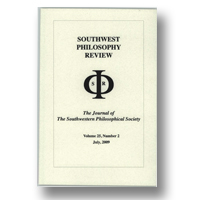|
27.
|
Southwest Philosophy Review:
Volume >
39 >
Issue: 2
Domenica Romagni
Descartes On Referring the Passions
abstract |
view |
rights & permissions
| cited by
As suggested by the title, Descartes’ Passions of the Soul deals primarily with states of the soul that he calls ‘passions.’ This designation includes all mental states that are actively caused by the body and passively received by the soul. However, as Descartes points out to the reader, there is a more specialized or proper usage of ‘passion’ that picks out a subclass of these and which aligns more-or-less with what we might now call ‘emotions.’ In this paper, I will address how Descartes classifies these ‘proper passions,’ paying special attention to how he distinguishes them from the other species of the passions in general. One of my primary aims will be to highlight an under-appreciated feature of the proper passions; namely, that they are distinct from other perceptions in their systematic divergence in terms of their distal or ‘first’ cause, their intentional object, and how they are ‘referred.’ After arguing for this distinctive feature of the proper passions, I show how it enables Descartes to provide a nuanced and multi-faceted account of our emotional experiences that incorporates external sensory perceptions, internal or bodily perceptions, and various cognitive assessments.
|
|
